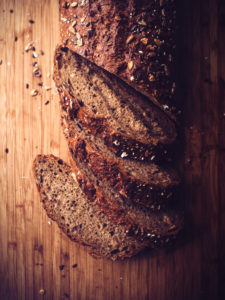The landscapes of my childhood are so different from those I view through my artfully barred windows. Instead of the lush, rolling hills carpeted with banana trees—Lake Victoria a slice of silver peeking from the top—our farmhouse rested in the center of miles of Midwestern fields, flat as a sheet of green construction paper. Though spread with a dull gray in winter, I can still hear the rustling of summer’s emerald cornstalks when I close my eyes.
One similarity I love about life in Uganda and life in central Illinois is the proximity to life cycles. From my mom’s garden with its rhubarb and asparagus and frothy heads of broccoli, to the ten chickens I presently have slaughtered about every six weeks for our family’s sustenance, there is something simple and good—something sobering—about seasons. About not simply grabbing my bag of chicken breasts from the price club freezer, but making a few portions smaller. Because actually, something else will need to die when our little family requires—requests?—more.
And this is what I have been thinking lately: That “give us our daily bread” is perhaps more evident when I am not merely sliding the cellophane off a perfectly shaped loaf from the store, which I picked up and gently tossed on that little shelf in my cart.

Author Christa Parrish (one of my current favorites), in her novel Stones for Bread, helped me to wrap my mind around the intense labor poured into a single loaf of bread. Historically, bread involved not only the typical rigorous farming efforts of plowing, watering, scything. As a farmer’s daughter myself, I know too well that hopeful gaze at the sky for rain (the drought of ’88 is still seared in my memory), or the prayers for rain to stop, for frost to hold off. And that’s modern farming. I wasn’t threshing wheat, or hunched over a stone, grinding our flour, hauling water from a river, or carefully laying a fire and stoking it.
Even now, the loaf landing neatly sliced on my table is actually the result of a number of highly complex activities begun months ago—years, if you consider the tending of the soil, the inventions of labor-saving machinery, the investments of the farmers in equipment and otherwise. God’s also arranged the arrival of electricity to the kitchen or a mechanic; the provision of fuel for the delivery truck, of marketing and human resource personnel to make sure there’s a company existing for this very purpose.
Daily bread in my mind has come to stand for what I need; what my body requires to sustain itself in this day. I ask for “daily bread” in my ability to thoughtfully and graciously parent and, say, not become the Incredible Hulk when my child launches something destructive over the stair railing. I need daily bread for the energy from my feet hitting the concrete floor in the morning to the time I tuck them (much dirtier now) beneath the blue coolness of the sheets at night. I repeatedly request wisdom for this blog, actually; I still liken that to waiting for manna, trusting God will reveal something of Himself to me that might be something I can share with you.
Daily bread, in all respects, then, is requesting not just soft, crusty slices on my children’s plates. It is an entire series of elaborate orchestrations God conducts to simply meet the need that sometimes, like a Pop Tart, simply arrives in my hand unceremoniously and just as quickly. When I worked in publishing, this included selling a number of books for me to keep my job and receive a paycheck. Here in Africa, it means God providing for a number of financial supporters (whom I steadfastly adore) who generously remember to sign up for automatic withdrawal or stick a check in the mail; generously sacrifice month after month after year. And this is on top of all the actions it took simply to make my bread from people around the world. (I generally eat around three times a day.)
I have thought often of Gandhi’s quote since moving to Africa: There are people in the world so hungry, that God cannot appear to them except in the form of bread. Now, there are so many gifts of grace required for bread, I may just see God all over bread itself.
Perhaps it’s also amazing that, thirty-five years into this, I at times struggle with unbelief in his intimate, intricate care for me.
Give us this day our daily bread is coming to mean for me a far greater trust in minute miracles, in which God sustains all the living beings looking to His hand–loaf after loaf.
Like this post? You might like
Why Cook? The eternal aspects of food (er, beyond Twinkies)
Barley, Love, and Blogging (Or, another small lesson from a 3,300 year-old-woman)
Yeah, but does God so love individuals? (As in, me?)












![Now You're Speaking My [Love] Language Now You're Speaking My [Love] Language](https://www.janelbreitenstein.com/wp-content/uploads/2015/08/love-languages-text-1.jpg)





Leave a Reply